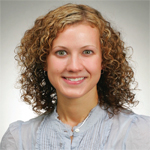“At OHSU, I received tremendous support from my mentors and program director,” he says. “That really changed the direction that my career went. I was mainly focused on clinical practice, but I have developed an immense interest in clinical research.”
While at OHSU, he won the Marshall J. Schiff Memorial Fellow Research Award given by the ACR and earned the gold medal for the “Knowledge Bowl” at the 2013 ACR/ARHP Annual Meeting. After a year of research training with James O’Dell, MD, at the University of Nebraska, he took a faculty position at Yale.
“The faculty at Yale is helpful and a pleasure to work with!” he says. “I am trying to develop my own spondyloarthritis clinic and research project on early diagnosis of spondyloarthritis here.”
Q: Why are you focusing on spondyloarthritis?
A: Spondyloarthritis poses significant challenges in terms of early diagnosis, assessment of disease activity, predicting response to the treatment and monitoring radiographic progression. Although it is as prevalent as rheumatoid arthritis, SpA is commonly under-recognized or recognized late; the average delay in diagnosis is 8–10 years. Now we have better treatment options available for spondyloarthritis. I am focusing on developing better screening tools to diagnose these patients early among the sea of patients with mechanical back pain.
Q: What would you change about rheumatology?
A: I think in rheumatology practice, the main issue is with early diagnosis given the non-specific and heterogeneous clinical presentation of these diseases. We need more research about biomarkers and newer diagnostic techniques with superior sensitivity and specificity for early diagnosis. Also, we need bigger patient registries and larger studies to learn more about the effective treatment strategies.
Q: What has the ACR meant to you during the early stages of your career?
A: It’s a great international organization, very supportive to the fellows in training and the young investigators. The ACR/ARHP Annual Meetings have been a tremendous learning opportunity.
Q: What does this award mean to you?
A: It gives me a sense of accomplishment—that I could do productive and constructive work during my fellowship. I have a lot of respect for this award. It gives me motivation to continue to do well in future!
 Emily Fox, MD, Pediatric Rheumatology Fellow, Stanford Children’s Health, Lucile Packard Children’s Hospital, Palo Alto, Calif.
Emily Fox, MD, Pediatric Rheumatology Fellow, Stanford Children’s Health, Lucile Packard Children’s Hospital, Palo Alto, Calif.
Background: A Distinguished Fellow Award from the ACR makes sense for Dr. Fox, given that the ACR has been instrumental in her career.



